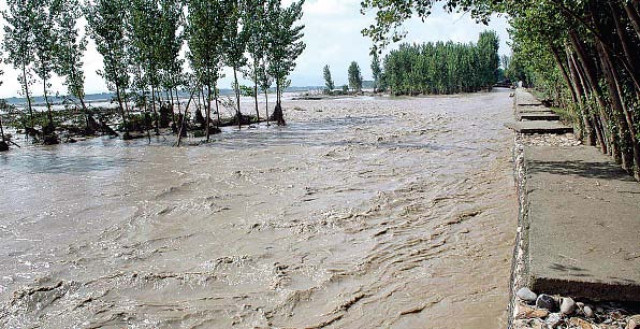Charsadda lies in ruins
Ruined houses, dead cattle and hapless survivors imploring for aid, these are the scenes one comes across in K-P.

Though most parts of Charsadda were ravaged by the deluge, the area between the Khiyali and Jindi rivers is the worst hit. Every village and hamlet lies in ruins. Sardarayb, the famous picnic point on the banks of the Kabul river, wears a haunted look, with no fish vendors, no boatmen, and no picnickers. It’s knee-deep stinking mud everywhere. And a pall of gloom hangs over the area.
A large strip of the Peshawar-Charsadda road is still under floodwater. And in villages along both sides of the road survivors can be seen rummaging through the rubble of their houses to look for any valuables.
Chuti Pul is situated on the main road, a few kilometres away from Charsadda city. Residents of villages on both sides of the road complain about slow government response to the flood tragedy. “We have not received anything from the government side two weeks after the floods destroyed our villages,” Anwer Zeb, a resident of Chuti Pul, told The Express Tribune at a makeshift tent pitched along roadside.
“We have lost everything in the flood. I managed to make this tent from plastic sheets to shelter my 16-member family,” Zeb said. “We are not getting anything except for these boiled rice,” he said, pointing to a bowl. Anwer said clean drinking water was not available in the area and survivors had to drink floodwater.
Recalling the deadly flood, Anwar said that the Jindi and Khiyali rivers broke their banks and surging floodwaters ravaged their villages within no time.
Syed Ghaus Ali Shah Bacha, another survivor, told The Express Tribune that at least 59 houses were destroyed in the village. “Nobody came to our help. God saved us,” an angry Bacha said, adding that the government has not offered them any relief even after the floods.
He said that no government official has visited them so far. “The aid is being distributed on a political basis. Nobody cares about poor survivors like us,” he complained.
Roaring waves of the Khiyali river have destroyed standing crops on hundreds of acres of farmland in the region which produces vegetables for Peshawar. As a result, prices of vegetables have skyrocketed in Peshawar since the flood hit the region. The deluge has also uprooted a huge plantation of poplar trees, which is the only source of supply for the local match industry.
Jehanzaib, a resident of Chuti Pul, said that his house was swept away by floodwater. And his family managed to save their lives somehow. Now he has returned to the ruins of his house. “We spent the last two weeks here,” he said, pointing to a plastic sheet tied to the damaged walls of his house to make an awning.
Jehanzeb said that skin diseases were spreading in the area. “Carcasses of dead animals are rotting everywhere. And the atmosphere is heavy with their stink, but nobody is there to dispose them of,” he added.
Aminullah, a resident of Chakisar village, told The Express Tribune that 1,200 houses in his area were washed away.He complained that local dealers have increased prices of LPG which is now selling at Rs150 per kilogramme.
The local administration says that around 500,000 people have been affected in the district.
Published in The Express Tribune, August 12th, 2010.













COMMENTS
Comments are moderated and generally will be posted if they are on-topic and not abusive.
For more information, please see our Comments FAQ